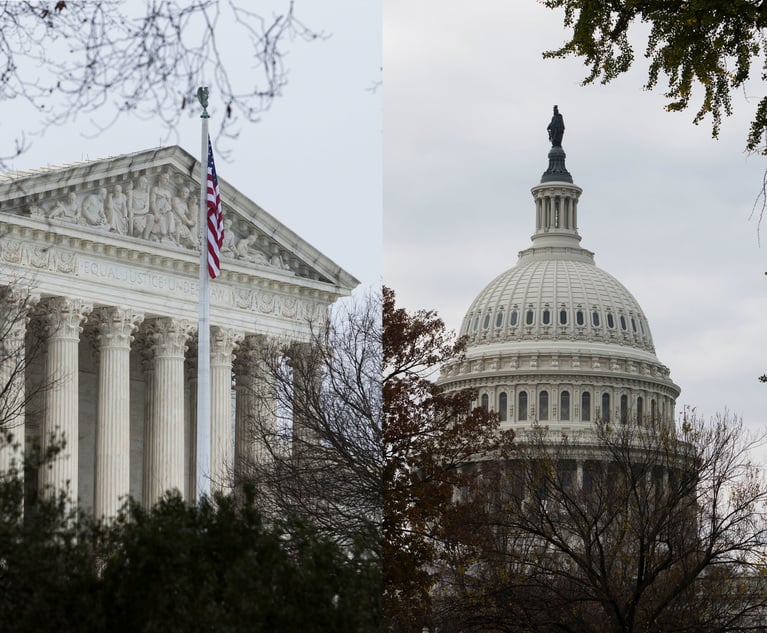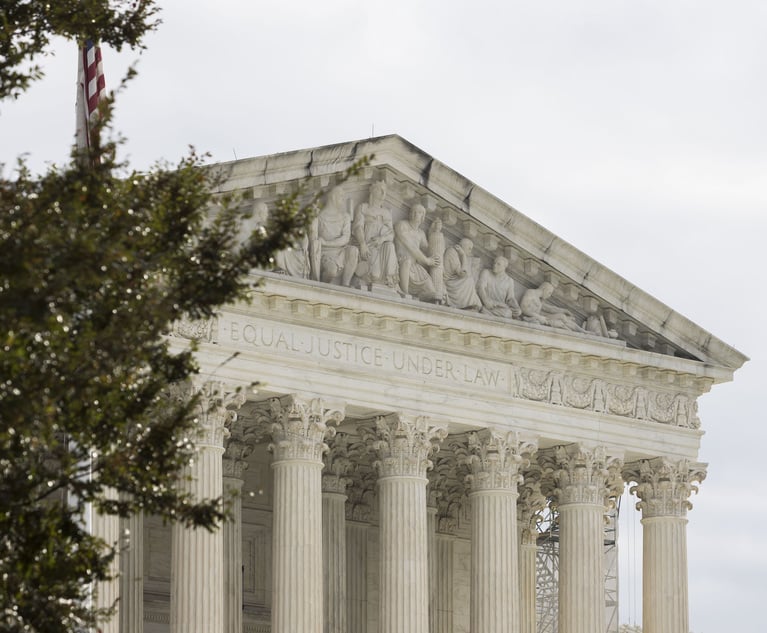When It's Summertime, Justices Hit the Road and Speak Out
After the term's last day, the justices play—and teach and make public appearances. Here are some highlights of their remarks so far.
July 18, 2017 at 03:46 PM
6 minute read
Ah, summertime at SCOTUS—the season when justices fan out across the globe to rest, to interact with the public and to teach law students in some of academia's most desirable destinations.
Justice Anthony Kennedy's perennial teaching gig at the University of the Pacific McGeorge School of Law program in Salzburg, Austria, made unexpected news when his wife Mary Kennedy fell and suffered a fractured hip. Chief Justice John Roberts Jr. will soon teach a course in New Zealand at the Victoria University of Wellington. Justice Samuel Alito Jr. has just finished up teaching in Rome for the Loyola University Chicago School of Law's Rome program, and Justice Ruth Bader Ginsburg is back from a stint in Malta for South Texas College of Law Houston. (Hat tip to SCOTUS Map, which tracks justices' public appearances.)
The court still handles important appeals—including the latest concerning the Trump travel ban—and justices have also been busy making appearances closer to home.
Here are some of the remarks justices have made off the bench since (or before) the court finished its business for the term in late June:

A Little Bit Shaky
At the Aspen Institute in Colorado on July 10, Justice Elena Kagan spoke about her first oral argument as solicitor general, as well as her path to being appointed to the Supreme Court. Her first time at the court lectern was in the re-argument of the landmark Citizens United case in September 2009. According to a local Aspen press report, Kagan said that as she approached the lectern, her heart was beating so hard that she could not hear. After she uttered one memorized sentence, Justice Antonin Scalia leaned over the bench to challenge what she had said: “Wait, wait, wait, wait.” In hindsight, Kagan said the interruption was a good thing. “My own view was that he knew that … I was a little bit shaky,” she said, “and he was going to put me into the game right away. When someone challenges you, you have to stand right back and that's what happened and it turned out fine.” Well, not exactly. The government lost the case.
Running the Zoo

Apart from riding in a convertible at a Fourth of July parade in Colorado, Justice Neil Gorsuch has made at least two public appearances since becoming a justice in April. The first was a June 2 discussion at Harvard University with Justice Stephen Breyer as part of a Marshall Scholar event. (Both justices were Marshall scholars, as was National Constitution Center president Jeffrey Rosen, who moderated.) Gorsuch said he has been asked, “Why would I want to go through what you go through every day? Is it worth it?'” His response: “Somebody's got to run the zoo.” More substantively, Gorsuch compared the British and U.S. judicial systems. “The similarities are profound—an adversarial system of justice, great respect for certain human rights. We believe in certain forms of limited government, separation of powers.” But there is one major difference, he said. “The notion of judicial review, to my British friends, is somewhat astonishing and very, very worrisome,” Gorsuch said. “Maybe worrisome to some here.”
Gorsuch's other appearance came July 17, when he filled in for Kennedy at the judicial conference of the U.S. Court of Appeals for the Ninth Circuit. He listened to two students making presentations about the Japanese internment cases, both referring to the current travel ban controversy. “Moments like these are really heartening for me,” Gorsuch told students. “It's like a shot in the arm—a vitamin B shot.”
I Wish You Bad Luck

With his son Jack Roberts in the audience, Chief Justice John Roberts Jr. managed to do the nearly impossible on June 3: he gave a memorable and different commencement speech. John Roberts spoke before graduates at Cardigan Mountain School, a New Hampshire boarding school for boys in middle grades. The money quotes:
“From time to time in the years to come, I hope you will be treated unfairly, so that you will come to know the value of justice. I hope that you will suffer betrayal because that will teach you the importance of loyalty. Sorry to say, but I hope you will be lonely from time to time so that you don't take friends for granted. I wish you bad luck, again, from time to time so that you will be conscious of the role of chance in life and understand that your success is not completely deserved and that the failure of others is not completely deserved either … I hope you'll be ignored so you know the importance of listening to others, and I hope you will have just enough pain to learn compassion. Whether I wish these things or not, they're going to happen. And whether you benefit from them or not will depend upon your ability to see the message in your misfortunes.”

'I'm Fine'
In a dialogue with longtime court expert Alan Morrison before the American Constitution Society, Breyer was asked about his health. His answer: “You know, I mean sometimes people do ask me that. The worst one was a woman who came up and said, 'You know, ever since the election I've been hoping you wouldn't die.' I said, 'Well actually, I was hoping that even before the election.' … But I'm fine.” Asked also about his bicycle injuries over the years, Breyer said, “It wasn't exactly a problem with my bicycle. It was a problem with my putting out my arm like that at the wrong time … Actually, the doctor said I could bicycle. He said, 'But if you fall off again, you're going to feel like such a moron that it's better to use a stationary bike.' So there we are.”
This content has been archived. It is available through our partners, LexisNexis® and Bloomberg Law.
To view this content, please continue to their sites.
Not a Lexis Subscriber?
Subscribe Now
Not a Bloomberg Law Subscriber?
Subscribe Now
NOT FOR REPRINT
© 2025 ALM Global, LLC, All Rights Reserved. Request academic re-use from www.copyright.com. All other uses, submit a request to [email protected]. For more information visit Asset & Logo Licensing.
You Might Like
View All
Roberts Calls Court's Relationship With Congress 'Strained.' Who's to Blame?

Judicial Conference Declines Democratic Request to Refer Justice Thomas to DOJ

Chief Justice Roberts Ends Year With Defense Against 'Illegitimate' Attacks on Judiciary

Trending Stories
- 1Restoring Trust in the Courts Starts in New York
- 2'Pull Back the Curtain': Ex-NFL Players Seek Discovery in Lawsuit Over League's Disability Plan
- 3Tensions Run High at Final Hearing Before Manhattan Congestion Pricing Takes Effect
- 4Improper Removal to Fed. Court Leads to $100K Bill for Blue Cross Blue Shield
- 5Michael Halpern, Beloved Key West Attorney, Dies at 72
Who Got The Work
Michael G. Bongiorno, Andrew Scott Dulberg and Elizabeth E. Driscoll from Wilmer Cutler Pickering Hale and Dorr have stepped in to represent Symbotic Inc., an A.I.-enabled technology platform that focuses on increasing supply chain efficiency, and other defendants in a pending shareholder derivative lawsuit. The case, filed Oct. 2 in Massachusetts District Court by the Brown Law Firm on behalf of Stephen Austen, accuses certain officers and directors of misleading investors in regard to Symbotic's potential for margin growth by failing to disclose that the company was not equipped to timely deploy its systems or manage expenses through project delays. The case, assigned to U.S. District Judge Nathaniel M. Gorton, is 1:24-cv-12522, Austen v. Cohen et al.
Who Got The Work
Edmund Polubinski and Marie Killmond of Davis Polk & Wardwell have entered appearances for data platform software development company MongoDB and other defendants in a pending shareholder derivative lawsuit. The action, filed Oct. 7 in New York Southern District Court by the Brown Law Firm, accuses the company's directors and/or officers of falsely expressing confidence in the company’s restructuring of its sales incentive plan and downplaying the severity of decreases in its upfront commitments. The case is 1:24-cv-07594, Roy v. Ittycheria et al.
Who Got The Work
Amy O. Bruchs and Kurt F. Ellison of Michael Best & Friedrich have entered appearances for Epic Systems Corp. in a pending employment discrimination lawsuit. The suit was filed Sept. 7 in Wisconsin Western District Court by Levine Eisberner LLC and Siri & Glimstad on behalf of a project manager who claims that he was wrongfully terminated after applying for a religious exemption to the defendant's COVID-19 vaccine mandate. The case, assigned to U.S. Magistrate Judge Anita Marie Boor, is 3:24-cv-00630, Secker, Nathan v. Epic Systems Corporation.
Who Got The Work
David X. Sullivan, Thomas J. Finn and Gregory A. Hall from McCarter & English have entered appearances for Sunrun Installation Services in a pending civil rights lawsuit. The complaint was filed Sept. 4 in Connecticut District Court by attorney Robert M. Berke on behalf of former employee George Edward Steins, who was arrested and charged with employing an unregistered home improvement salesperson. The complaint alleges that had Sunrun informed the Connecticut Department of Consumer Protection that the plaintiff's employment had ended in 2017 and that he no longer held Sunrun's home improvement contractor license, he would not have been hit with charges, which were dismissed in May 2024. The case, assigned to U.S. District Judge Jeffrey A. Meyer, is 3:24-cv-01423, Steins v. Sunrun, Inc. et al.
Who Got The Work
Greenberg Traurig shareholder Joshua L. Raskin has entered an appearance for boohoo.com UK Ltd. in a pending patent infringement lawsuit. The suit, filed Sept. 3 in Texas Eastern District Court by Rozier Hardt McDonough on behalf of Alto Dynamics, asserts five patents related to an online shopping platform. The case, assigned to U.S. District Judge Rodney Gilstrap, is 2:24-cv-00719, Alto Dynamics, LLC v. boohoo.com UK Limited.
Featured Firms
Law Offices of Gary Martin Hays & Associates, P.C.
(470) 294-1674
Law Offices of Mark E. Salomone
(857) 444-6468
Smith & Hassler
(713) 739-1250










